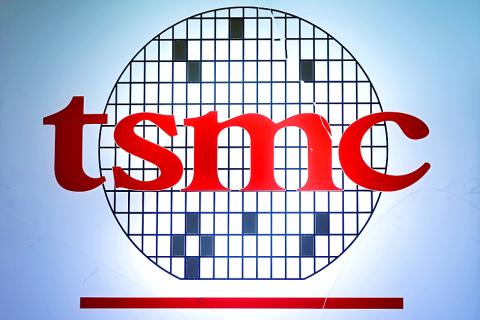Taiwan Semiconductor Manufacturing Co (TSMC, 台積電) yesterday said it would continue supplying wafers and technologies to Huawei Technologies Co (華為) as its exports are in full compliance with international trade rules, despite the US’ latest sanctions on the Chinese firm.
The chipmaker’s move came as a slew of global firms followed the lead of Aphabet Inc’s Google in cutting ties with the world’s No. 2 smartphone maker after Washington put Huawei on a blacklist.
TSMC, which counts Huawei among its top clients, said that it is the company’s long-term practice to conduct due diligence on every product it exports to make sure it is in compliance with international trade rules.

Photo: Reuters
“Based on our due diligence, we do not anticipate any major changes in how we ship wafers and how we deliver technologies to this client,” TSMC spokesperson Elizabeth Sun (孫又文) said on the sidelines of the chipmaker’s annual technology symposium in Hsinchu.
TSMC products contain less than 25 percent US-origin software and technology during the production process, Sun said, citing an internal assessment and an appraisal from an outside counsel from the US.
“We are our customers’ enabler. That includes HiSilicon Technologies Co (海思半導體),” Sun said.
HiSilicon helps design in-house premium mobile processors, including the Kirin family used in Huawei’s high-end smartphones.
TSMC said that some of it clients have said they would stop could lead to reduced orders from certain clients.
The company does not plan to revise down its second-quarter financial forecast.
It is sticking to its forecast of revenue growing at a quarterly pace of 7 percent this quarter.
TSMC said it does not plan to accelerate capacity expansion at its new factory in Nanjing to cope with the escalating US-China trade dispute.
Its goal is to boost annual capacity at the 12-inch fab to 15,000 wafers by the end of this year and to 20,000 wafers next year.
TSMC chief executive officer C.C.Wei (魏哲家) added that the company is committed to investing heavily in Taiwan.
Over the past five years, TSMC has spent US$50 billion on capacity expansion and technology development, he said.
This year, the company plans to invest between US$10 and US$11 billion on new facilities and equipment, which should increase total annual capacity by about 2 percent to 12 million wafers.
TSMC has started equipment installation at its Fab 18, paving the way for the company to produce the world’s first 5-nanometer chip in the first quarter next year.
The company has also earmarked a piece of land for next-generation 3-nanometer chips, Wei said.

To many, Tatu City on the outskirts of Nairobi looks like a success. The first city entirely built by a private company to be operational in east Africa, with about 25,000 people living and working there, it accounts for about two-thirds of all foreign investment in Kenya. Its low-tax status has attracted more than 100 businesses including Heineken, coffee brand Dormans, and the biggest call-center and cold-chain transport firms in the region. However, to some local politicians, Tatu City has looked more like a target for extortion. A parade of governors have demanded land worth millions of dollars in exchange

An Indonesian animated movie is smashing regional box office records and could be set for wider success as it prepares to open beyond the Southeast Asian archipelago’s silver screens. Jumbo — a film based on the adventures of main character, Don, a large orphaned Indonesian boy facing bullying at school — last month became the highest-grossing Southeast Asian animated film, raking in more than US$8 million. Released at the end of March to coincide with the Eid holidays after the Islamic fasting month of Ramadan, the movie has hit 8 million ticket sales, the third-highest in Indonesian cinema history, Film

Taiwan Semiconductor Manufacturing Co’s (TSMC, 台積電) revenue jumped 48 percent last month, underscoring how electronics firms scrambled to acquire essential components before global tariffs took effect. The main chipmaker for Apple Inc and Nvidia Corp reported monthly sales of NT$349.6 billion (US$11.6 billion). That compares with the average analysts’ estimate for a 38 percent rise in second-quarter revenue. US President Donald Trump’s trade war is prompting economists to retool GDP forecasts worldwide, casting doubt over the outlook for everything from iPhone demand to computing and datacenter construction. However, TSMC — a barometer for global tech spending given its central role in the

Alchip Technologies Ltd (世芯), an application-specific integrated circuit (ASIC) designer specializing in server chips, expects revenue to decline this year due to sagging demand for 5-nanometer artificial intelligence (AI) chips from a North America-based major customer, a company executive said yesterday. That would be the first contraction in revenue for Alchip as it has been enjoying strong revenue growth over the past few years, benefiting from cloud-service providers’ moves to reduce dependence on Nvidia Corp’s expensive AI chips by building their own AI accelerator by outsourcing chip design. The 5-nanometer chip was supposed to be a new growth engine as the lifecycle